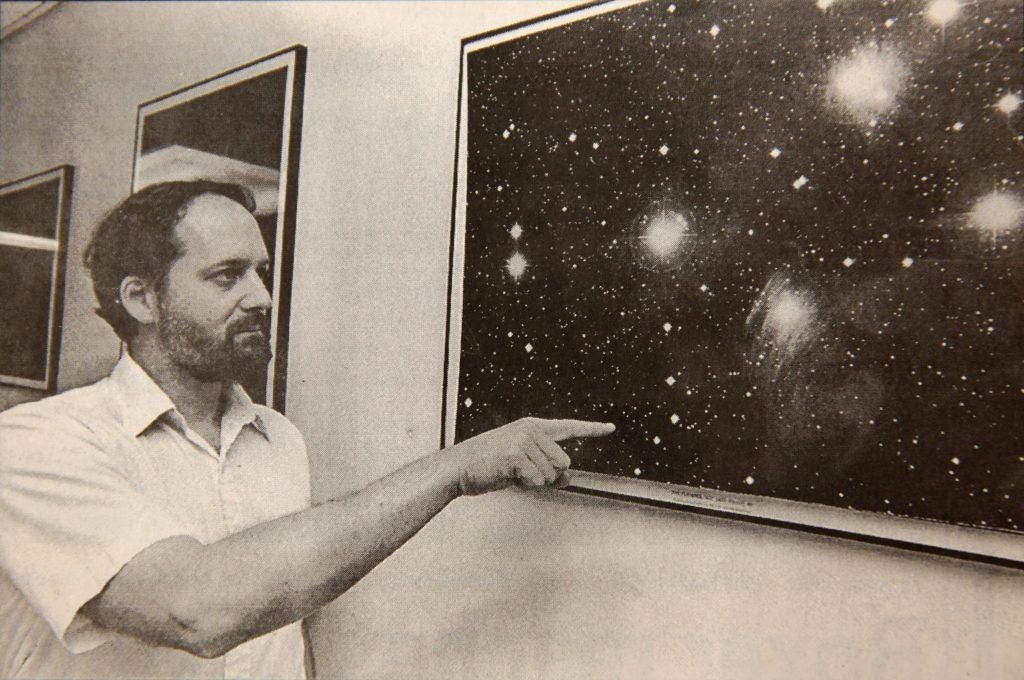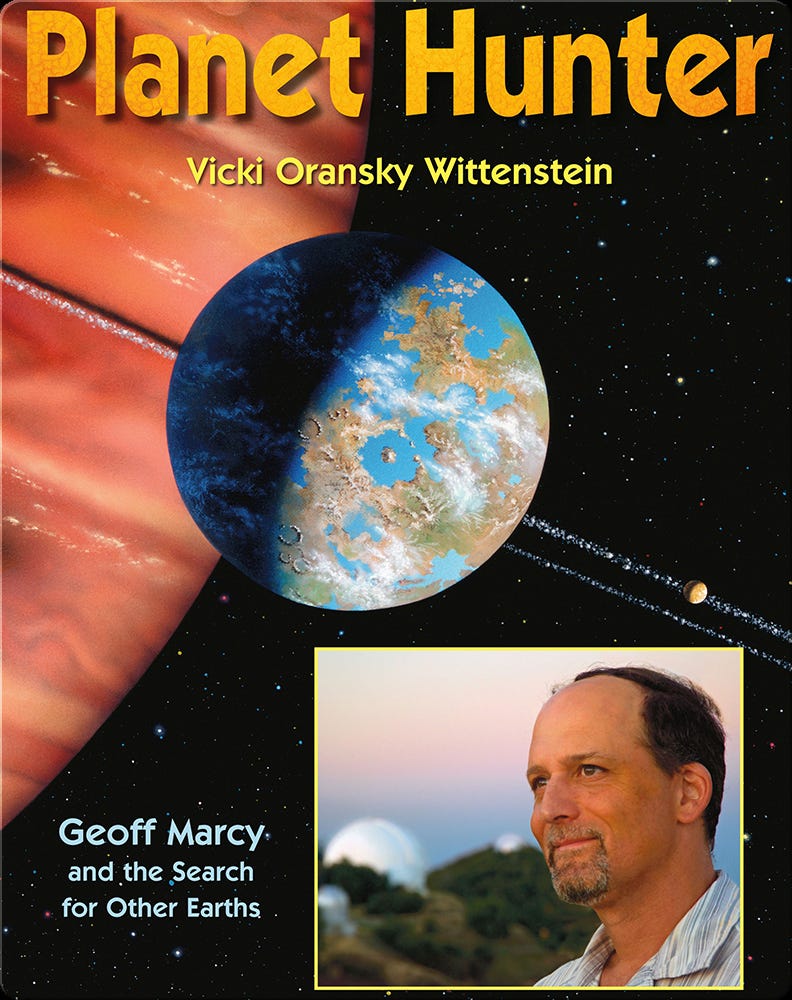Astronomers Build a Feminist Black Hole for a Former Star
- Get link
- X
- Other Apps
Astronomers Build a Feminist Black Hole for a Former Star
And plans are afoot to prevent future alleged “harassers” from receiving author credit in scientific journals
If you want to imagine a “feminist future,” consider the never-ending drama, at once sentimental and punitive, surrounding disgraced scientist Geoff Marcy, once a revered exoplanet researcher, now a scapegoated “sexual harasser” whom the politically correct cannot cease to accuse.
The destruction of Marcy’s reputation and career as a result of dubious allegations never tested in court has failed to appease his persecutors, one of whom alleged in a recent Science article that even seeing the man’s name in print may be “triggering” for “survivors.” In this article, “After outcry, disgraced sexual harasser removed from astronomy manuscript,” the astronomy community is portrayed as eager to formulate rules whereby those deemed to have violated standards of conduct “should not be allowed to be authors on papers”—even when the papers could not have been written without their research.
The determination to blot out Marcy’s name is typical of an academic community obsessed with retribution. In many of the most prestigious astronomy and astrophysics departments across the western world, research into planets, stars, galaxies, and the universe has been largely eclipsed by public breast-beating about misogyny and racism. When activists in groups such as Women in Astronomy or Particles for Justice aren’t savaging brilliant men like Matt Taylor or Alessandro Strumia, men whose only crime was running afoul of intersectional feminist orthodoxies, woke academics seem determined to do as little actual research as possible, instead organizing campaigns like the Strike for Black Lives, the Indigenous protest against the Mauna Kea telescope, or the drive to change the name of NASA’s new space telescope. Fashionable stances and the mobbing of dissidents have taken the place of science.
The attack on Geoff Marcy, much-lauded Professor of Astronomy at the University of California, Berkeley, began many years ago, when a Title IX investigation launched in 2014 found him guilty of sexual harassment. According to a report based on the investigation, “Four women alleged that Marcy repeatedly engaged in inappropriate physical behavior with students, including unwanted massages, kisses, and groping.” All of the complaints referred to incidents that had occurred many years previously, some of which Marcy remembered quite differently. One complainant said she saw Marcy become “inappropriately touchy” with an undergraduate student at a conference. Another said Marcy “began to rub the back of her neck” after giving her a lift home in his car, an experience that left her confused and ashamed for years. In the most egregious claim, a woman reported, eight years after the fact, that at a post-colloquium dinner with colleagues, Marcy “placed his hand on her leg, slid his hand up her thigh, and grabbed her crotch.”
Marcy denied the crotch-grabbing allegation and said that if he had ever touched students “inappropriately” (never more, he insists, than a hug and kiss on the forehead or cheek; see his account of the allegations), it was because he was offering friendly encouragement to young women he cared for. In one case of a third-party allegation, Marcy reported that the “victim” denied that Marcy had done anything wrong. Because there had been no reports of misconduct occurring in the previous five years, the university did not fire him at the conclusion of the investigation, instead laying out strict rules of conduct.
But that wasn’t good enough for the astronomy and astrophysics community, where outrage erupted that Marcy was still working in academia at all. Soon enough, he was forced to resign from research committees and barred from attending conferences (see Lawrence Krauss’s explanation here). Numerous colleagues denounced him for tarnishing the reputation of his field. The backlash was so heated that Marcy—once a Nobel Prize contender—had little option but to take early retirement, apologizing for having made some students uncomfortable and stating emphatically that “There was no sex, no intention of sex, and no abuse of power that resulted in damaging any of the complainants’ careers.” Though he went quietly into the night, apologetic and pro-feminist in his public statements, it wasn’t the end of his shunning.
For Marcy’s detractors, the Title IX proceedings were definitive (one woman is quoted as claiming, falsely, that it “almost never happens” that such investigations side with complainants). In reality, the Title IX process is less than rigorous, as researchers K.C. Johnson and Stuart Taylor have argued in Campus Rape Frenzy: The Attack on Due Process at America’s Universities. Investigations are often conducted by ideologues with no legal training in how to gather facts, interview witnesses, or assess evidence. Sometimes the investigator and the adjudicator are one and the same person, and the complaint is usually decided using a very low evidentiary standard, that of balance of probabilities—far lower than the standard used in criminal trials. Ideological pressures on departments to show that they take claims of sexual harassment seriously almost always play a role in the outcome.
Missing in reports about what Marcy allegedly did to students are any mitigating details about the women involved in these long-after-the fact complaints. Why did they begin coming forward years after the alleged incidents? Had they known or communicated with one another? When I was a student in the early 1990s, grad school life was rife with romance, liaisons, and rumors of liaisons; many female students developed crushes on their male teachers, and a significant number of students ended up living with or marrying their profs. It was generally considered nobody’s business what consenting adults did outside the classroom or lab, and it was thought that adult women could handle an unwanted kiss or touch. Most of the alleged incidents in Marcy’s case took place in broad daylight on or near a university campus or conference venue, even in crowded rooms filled with other students and professors—hardly the typical arenas of a sexual predator.
It is highly possible that at least some students enjoyed and overtly encouraged Marcy’s attentions, his support, and the academic opportunities he offered them. Some of the accounts of harm—like that of the woman wounded for years after her neck massage—are quite incredible. Could anyone seriously interested in an astronomy career—especially in this age of affirmative action and enthusiastic promotion of women—have been put off by Marcy’s actions? Whatever trauma Marcy allegedly caused with a neck massage or kiss on the forehead must have been abundantly ameliorated by the outpouring of concern for his “victims” and the years-long damning of Marcy as a moral monster.
Yet the kill-joys still aren’t willing to let it go. Not content with making sure that no semblance of an academic career can remain for Marcy, some activists want to make it impossible for him to involve himself at all in astronomical research, or even to be properly acknowledged for his significant past contributions.
In the years since his retirement, Marcy has co-authored a number of papers with other researchers, but now, according to the censorious article in Science, some of those researchers find themselves under pressure not to list Marcy as co-author even though key data is owed to him. Apparently, making astronomy safe for women involves removing his very name from the work he pioneered. Though one co-author (anonymously) maintained Marcy’s importance (“There’s no question in my mind that Geoff did contribute to the early days of the project”), another on the research team professed to have seen the light (“It created the appearance … of people being accepting and tolerating behavior that clearly should not be accepted or tolerated”) while one went even further to emphasize the harm Marcy still symbolically represents: “A lot of people in astronomy, especially a lot of women, are survivors of sexual assault and sexual harassment themselves, so seeing your name next to his—seeing his name at all—can be extremely triggering for a lot of people.”
Here we come to the nub of the matter, the tribute to the devouring sensibilities of self-proclaimed victims, to which an entire academic field must show deference. One can only wonder how “survivors” such as these, unable even to look at the name of a man found guilty of giving a neck massage or being “touchy,” will be able to handle the sometimes conflictual interactions of men and women in academia. It seems that no punishment short of total personal obliteration can satisfy the posse opposed to Marcy. The president of the American Astronomical Society has confirmed that other alleged harassers may be barred in future from authorship credit as well.
The possibility that, well over a decade following the investigated incidents, Marcy could be a changed and chastened man does not seem to occur or matter to anybody (and, frankly, I hope Marcy is not chastened but defiant and unconcerned, living a life of insouciant joy, and no longer a male feminist).
Clearly, the Marcy scandal has nothing to do with curbing harassment or improving the research climate in academia.
It is about the female power to damsel; and the male impulse to white knight. It is about carrying on the attack against Marcy, a scapegoat for Astronomy’s sin of former heterosexual maleness, as unremittingly as possible. It’s about sending a clear message to other men in astronomy: you will never be able to do your research without awareness that one wrong step—or even no wrong step at all, even a perceived failure to toe an ideological line—can bring everything you’ve worked for crashing down. If that happens, detractors will emerge from every corner of the discipline to denounce your alleged harmfulness, and supporters will be few and far between. Your university, whatever the contributions you’ve made over the years, will consign you to outer darkness at the first whiff of scandal. And virtue-signalers will out-do one another in talking about how much more needs to be done to purify the field.
The report on the banning of Marcy’s name as co-author ends ominously with a statement by Bruce Macintosh, director of the University of California Observatories. The investigation into Marcy “was a start of a wake-up moment for astronomy,” he said prudently. “But we have a long way to go.”
- Get link
- X
- Other Apps



Comments
Post a Comment